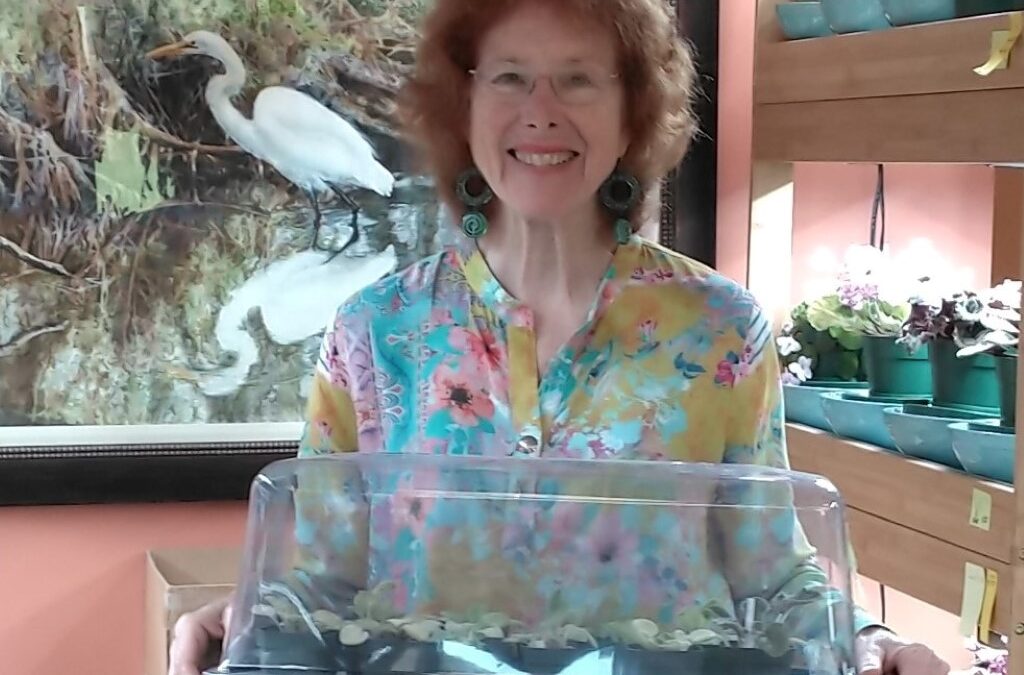
by | | Inspiration, NoSearch
Mary Ann Booth Cabot, nationally acclaimed nature artist and longtime member of the Roswell Garden Club, passed away peacefully February 6. One member of the club remembered her with these words, “She was so talented, kind, and had such a darling sense of humor.” Another said, “Mary Ann was an incredible woman, an outstanding artist, and a great gardener. She will be missed by all who knew her.”
Mary Ann was a strong, energetic woman who led an incredible life. Mary Ann said that she never forgot her childhood walks in her grandmother’s garden, a garden so colorful that bowls of her flowers decorated the family church every Sunday. “As a child, I spent hours in that garden. Today, when I paint flowers, birds, and landscapes, I recreate the peace and harmony I felt there.”
One RGC member shares “I remember meeting Mary Ann when she was a very young artist just starting her career. She was set up in a park in Savannah and I purchased her black and white Aunt Odie’s Porch. She was wearing jeans, a peasant top and her hair was in a ponytail. Her style of painting and her personal style would grow and change over the years, but even in her youthful days she had a radiant smile and caring personality that drew people to her. Over the years I admired her as she faced life’s issues with determination and inspired many.”
As RGC’s second vice president and program planner for one and a half terms, Mary Ann brought us many entertaining and informative speakers. In addition, she graciously filled in at the last second when one speaker was a no-show. With great aplomb, Mary Ann illustrated, on paper towels, how to use light and rhythm when designing a garden. Her knowledge and artistry were evident in her gardens.
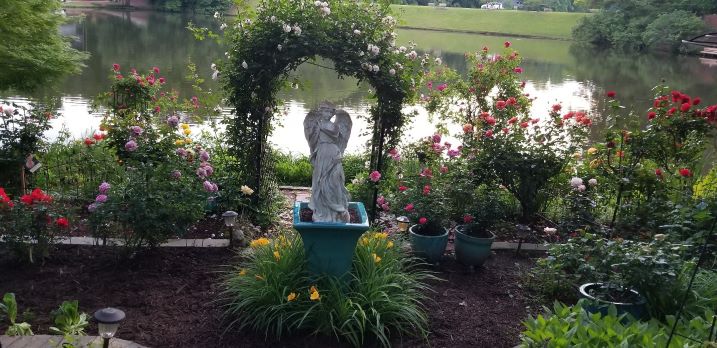
Through her work as an artist, teacher, and mentor, Mary Ann made a difference in the lives of so many. We were lucky to have Mary Ann in the Roswell Garden Club family. Her shining personality and artistic legacy will live on in our hearts.
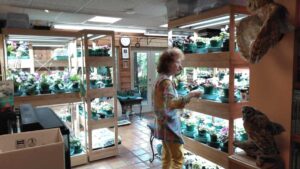
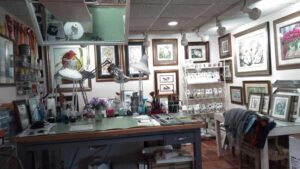
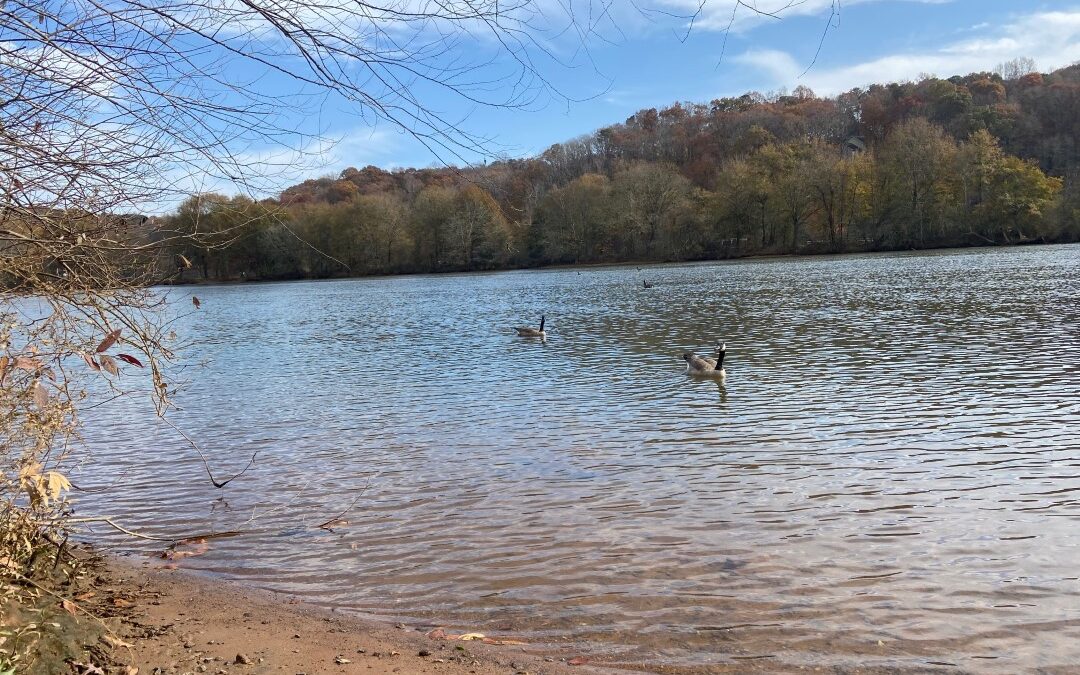
by | | Environment
The Georgia Legislative session has begun, and many bills are being introduced that concern our members. Okefenokee Swamp protection and Coal Ash disposal are the two big concerns. The Georgia Water Coalition, GWC, has provided the following summary of the issues being followed–and a request to contact your legislator. You can write your own letter, or use the link provided, which automatically sends to your legislators from the address you provide. You can edit the letter as you wish to express your personal views. You can also get more detailed info on the issues by contacting the person listed.
…Barbara & Tally, GCG Legislative Team Members
GWC Priority Legislation
Each year, the GWC membership adopts two to three priority issues addressing critical threats to Georgia’s waterways. This year, the GWC is committing again to two issues we have been slowly gaining ground on for a number of years. With your advocacy and support we can continue to collect victories for the environment.
Protecting the Okefenokee Swamp
An Alabama-based company, Twin Pines Minerals, LLC, is proposing a mining operation that threatens the Okefenokee and tourism related jobs in the area. Mining next to the swamp can cause lasting and irreversible negative impacts to the swamp, its wildlife, regional ecotourism and adjacent timberlands. Industrial mining operations near the entrance of a world-renowned wilderness area threatens jobs. The Okefenokee Wildlife Refuge brings an estimated $64.7 million in tourism dollars and local jobs.
The cities of Homeland, Kingsland, St Marys, Waycross/Ware County, and Valdosta have passed local resolutions asking state officials to do everything possible to protect the Okefenokee.
The Okefenokee is the wrong place to mine. GWC supports legislation prohibiting mining the sensitive environments adjacent to and within the Okefenokee Swamp. The Okefenokee is the wild heart of Georgia. Don’t risk it. Protect the future of the Okefenokee today. Ask legislators to PASS LEGISLATION to permanently protect the Okefenokee Swamp from this and future risky mining proposals. For more information, please contact Megan with One Hundred Miles.
Safe Coal Ash Disposal
Coal ash is the toxic waste left behind from coal-burning energy production. Coal ash contains dangerous heavy metals. More than 80 million tons of coal ash are stored in unlined pits along Georgia’s major rivers. Georgia Power is currently pursuing plans to permanently leave approximately 45 million tons of this waste mixed with groundwater in unlined pits along the Coosa, Chattahoochee and Ocmulgee rivers.
In January, the U.S. Environmental Protection Agency referenced the unsafe storage of toxic coal ash in Georgia. The agency clarified that federal law does not allow disposal of coal ash in groundwater. Georgia’s own laws must be fixed to ensure safer storage of coal ash.
HB 647 (Rep. Vance Smith,R- Pine Mountain, and HNRE Chair Rep. Lynn Smith, R-Newnan) addresses post-closure groundwater monitoring at coal ash disposal sites. The Senate Natural Resources Committee needs to hold a hearing and vote on this piece of legislation.
HB 176 (sponsored by Rep. Debbie Buckner, D-Junction City, Mary Margaret Oliver, Mary Frances Williams and others) and SB 230 (sponsored by Sen. Jen Jordan, D-Atlanta, and others) would require that coal ash be disposed of in lined, permitted solid waste landfills.
Status: HB 647 passed the House in 2021 and now awaits a hearing in Senate Natural Resources. HB 176 and SB 230 were introduced in 2021 and are stalled in their respective House and Senate Natural Resources Committees.
What you can do: Contact your legislators and ask them to support legislation to move coal ash away from our water resources.
GWC strongly supports HB 176 and SB 230. GWC supports and is working to improve HB 647. For more information, please contact Kevin with Chattahoochee Riverkeeper.
If you want to receive alerts when the GWC has calls to action on our priority legislative issues, please sign up for Protect Georgia. Protect Georgia alerts you as critical issues affecting our communities, environment and property rights arise. You can also see the GWC’s position on legislation we are tracking here.
Photo by RGC 2021 High School Environmental Competition Blogger Claire Mulkey
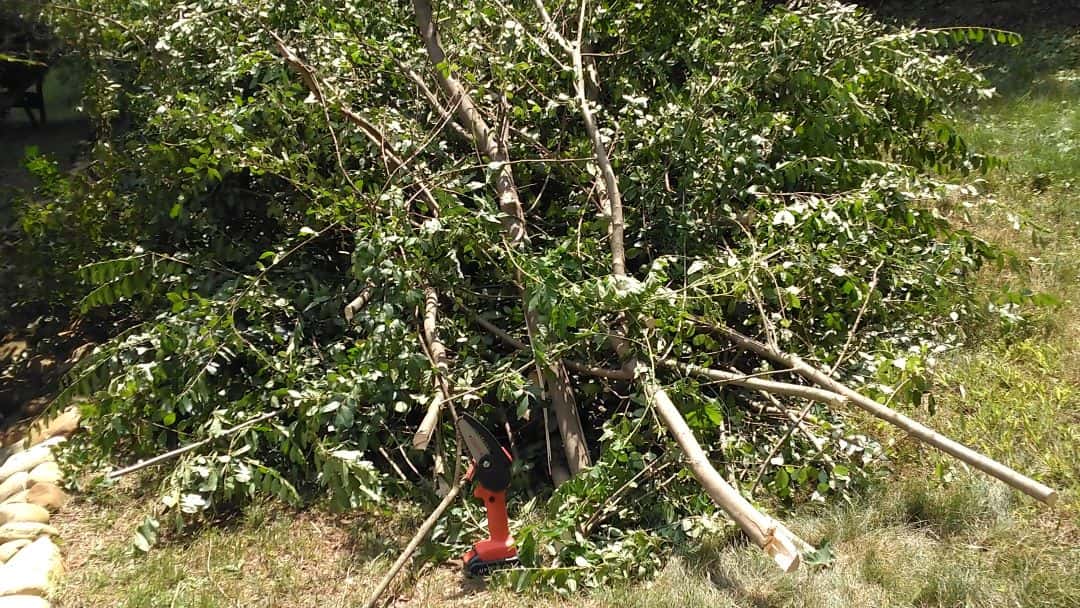
by | | Gardening
Last spring, I decided it was time to give up my chain saw. I was tired of the hassles involved with keeping it in good working order and all of the steps for safe use. I was relieved to let it go, but a little sad. Then I saw an ad for a tiny 4” chain saw. It’s a little bigger than my hand, weights about 5 pounds with the battery installed, and can cut branches and trunks up to about 6”. I had to have one.
I love that little chain saw. As soon as it arrived, I put it to use. Its rechargeable battery works for several hours, and mine came with 2 batteries. I run out of energy long before the chain saw does. I’ve been working on a major project clearing trashy trees from my back yard and replacing them with nicer understory trees and shrubs. My little chain saw has been handy in chopping down the trees and in chopping them into pieces that fit into the decomposable yard bags I can put out for weekly city pick up. As you can see in the photo, that little chain saw can do some mighty work. BTW, the battery did not run out while cutting down or chopping up everything in the picture.
A few weeks ago, a huge storm blew through here, knocking down tons of limbs from my veteran trees. My trusty little chain saw made the clean-up fun instead of an exhausting chore.
If you have trees or large shrubs, I highly recommend a tiny chain saw. I imagine products vary, so in a completely unsolicited and uncompensated  endorsement, here’s the one I bought, in case you are in the market. I bought the MKSENSE Mini Chainsaw, 4-Inch Electric Chainsaw Handheld Mini Pruning Shears Chainsaw for Tree Trimming Wood Cutting (2 Battery & 2 Chain &1 Box & Installation Tool) on Amazon.
endorsement, here’s the one I bought, in case you are in the market. I bought the MKSENSE Mini Chainsaw, 4-Inch Electric Chainsaw Handheld Mini Pruning Shears Chainsaw for Tree Trimming Wood Cutting (2 Battery & 2 Chain &1 Box & Installation Tool) on Amazon.
Here’s to happy gardening with your mini-chainsaw.
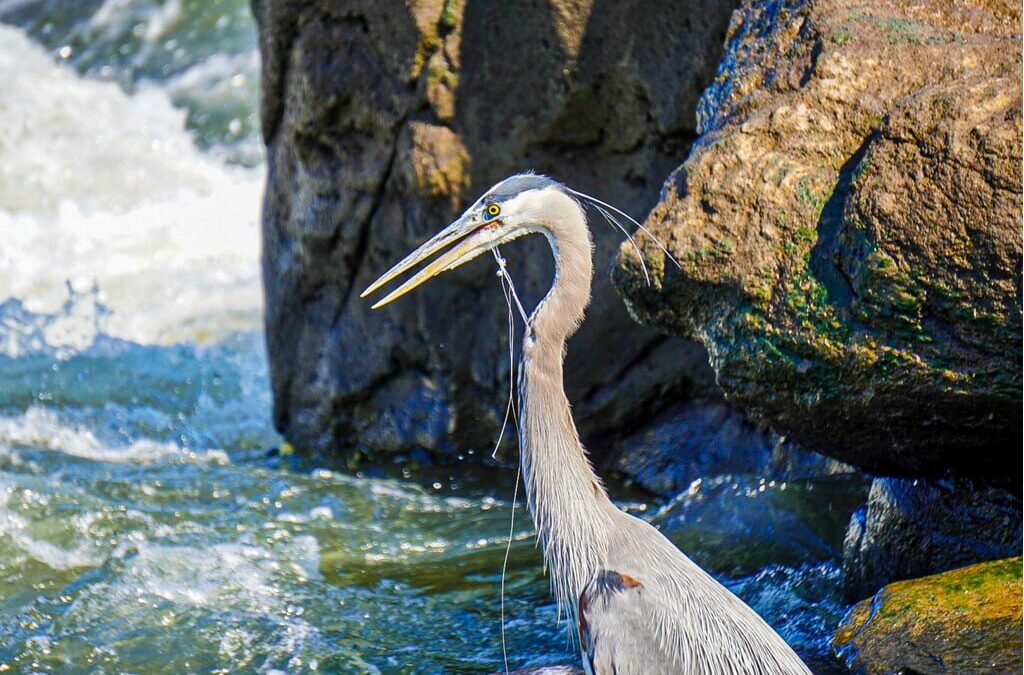
by | | 2021 Blog Competition, Environment
Featured Image: Among other plastics in the area, fishing line is among the most harmful to nearby wildlife, with an estimated 100,000 animals dying each year. (Credit: Chattahoochee River Conservancy)
Plastic, Styrofoam, Oil— these three pollutants products have made their way into our oceans, rivers, and lakes. Georgia’s own Chattahoochee river is no exception. Once a beautiful sight to locals and hikers, the river is now facing every type of pollution due to construction and littering.
In an article by The Signal, writer Gabby Miller stated that, due to construction in the area, dozens of pollutants are washed into the river when it rains, like “oil” and “tire dust” and that “rainwater mixed with excess from the roadways is the root of a lot of the pollution in the river”.
Unfortunately, construction isn’t the only thing harming the Chattahoochee River. Miller goes on to say that “the trash you litter can go anywhere” as it’s “practically weightless”. It’s noted that the litter causes different types of pollution that can “cause harmful effects on the precious river ecosystem”. Among the litter discarded into the river and surrounding areas, fishing line is among the most destructive. The Chattahoochee River Conservancy states that “discarded fishing line kills more than 100,000 marine life every year and can take hundreds of years to decompose”.
And while plastic has appeared in the Chattahoochee for decades, a new problem has risen as a result of the COVID-19 pandemic: single-use masks and gloves. WSBTV Atlanta brought awareness to this problem in an article back in late 2020, where Jason Ulseth stated that people aren’t “just littering there” but also “impacted our river and our water supplies”. As the pandemic continues and the demand for single-use products increases, locals can expect to see more litter flowing down the Chattahoochee.
While plastic and pollution have and will continue to plague the river for years to come, certain organizations are already taking initiative to conserve the Chattahoochee.
Back in June, the Chattahoochee River Conservancy installed a Watergoat Trash Trap, which is made up of “a series of buoys and netting” and is expected to prevent “any type of trash and debris” from going further up the river. Additionally, the organization hosted the “Riverbend Cleanup” where they collected 400 pounds of trash from the river and surrounding areas.
Furthermore, Chattahoochee Riverkeeper’s annual “Sweep the Hooch” cleanup brings “hundreds of volunteers” together to clean “50+ parks, tributaries, and access points” along the river.
In addition to these organizations and volunteers who spend countless hours removing litter and debris, there are certain things you can do to prevent future pollution of the river, by:
- Refraining from using single-use items like gloves, masks, straws, etc.
- Reducing your waste
- Limiting the amount you drive; instead, walk to nearby stores and parks
- Properly dispose of any litter you see in and around the river
- Advocate for the Chattahoochee River in your community by reminding others to be mindful of their surroundings
By conserving the Chattahoochee, we’re not only conserving the Earth—but our future, too.
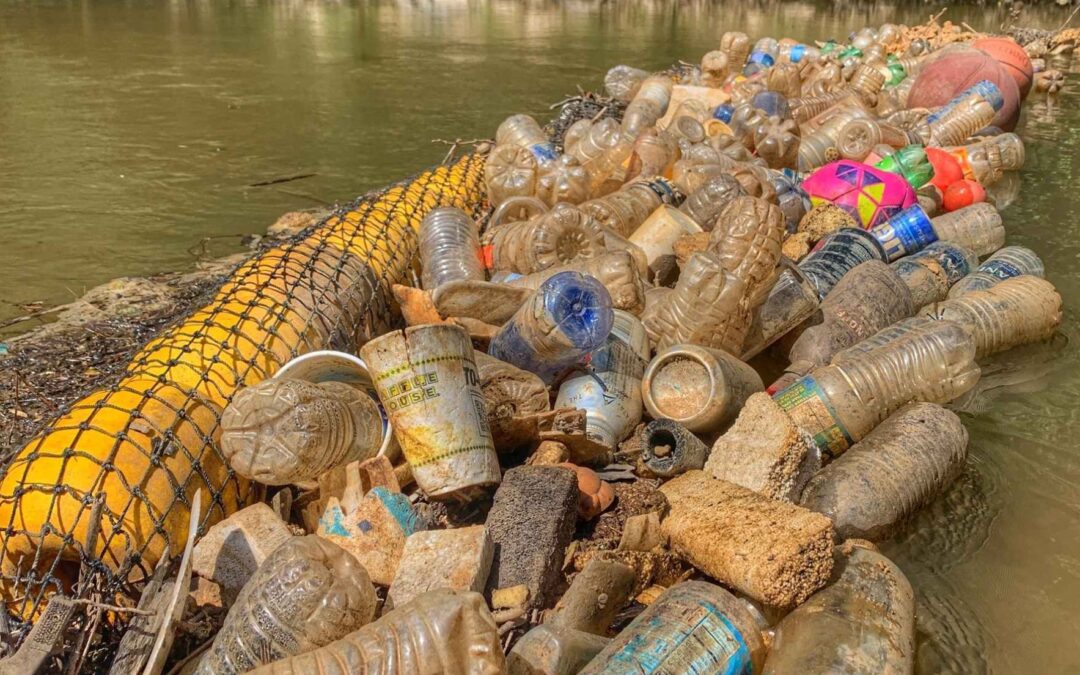
by | | 2021 Blog Competition, Environment
At first glance, the Chattahoochee River is the apex for leisurely activities. A drive down Azalea Dr. encompasses parking lots packed to the brim with families canoeing, river tubing, paddleboarding, etc. In addition, there are countless rowing organizations that hold their practices at the river. As many of these other individuals, I have indulged in my fair share of Chattahoochee activities. I remember one specific time, I was river tubing for the 4th of July with a friend and her family. I thought it was odd that her mother reiterated that we shower well after our little excursion, and I assumed it was because it was a river, and that is what you always do. Well, let’s just say that in recent years I have holistically discovered why she was so persistent in making sure we were clean.
The Chattahoochee River is the main water supply for Roswell and other surrounding counties. With this in mind, it is vital to recognize that the water that most of the households and businesses also flows back into the Chattahoochee creating an infinite loop of consumption and supply. For every toilet flushed, load of laundry washed, or garbage disposal ignited, all of this waste ends up back into the water supply, and though we are privileged enough to have water treatment plants, there is always excess that is not able to be removed. When there are flooding and storms, these drainage systems are not able to take in all of the water to these treatment plants, and the rest is just dumped back into the Chattahoochee. High levels of harmful and contaminating bacteria invade the waters, and this places strains on the recreational use of the river. The cyclic nature of water pollution will never be mended unless there is individual intervention to alleviate some of these struggles and strains on our water supply.
Though there is not much that we can do about the flooding and storms, there are ways that each individual can decrease the amount of waste that ends up in the water. For starters, flushing only toilet paper and human excretion is vital in the process of human wastewater treatment. Any other materials such as feminine products, toys, fabric, etc. will only be harmful in the process of removing solids in the primary stage of water treatment. Additionally, the use of safe laundry detergents, dish soaps, shampoos, etc. will decrease the risk for chemicals that are not filtered out completely in the water supply. Many people do not know that the components of their soaps cannot always be chemically or bacterially removed during treatment. Finally (and perhaps the most obvious), the dumping of solid waste such as plastic bottles, food containers, and garbage is going to be damaging to not only the water itself, but to aquatic life, some of which we rely on for consumption.
It is with great importance that every single person does their share in making sure that the right methods are integrated into everyday waste disposal to ensure the decrease in water pollution and to allow us to continue the activities we all cherish on a hot summer afternoon!
Picture from Chattahoochee River Conservancy

by | | 2021 Blog Competition, Environment
The Chattahoochee River is at the core of Roswell’s existence. Not many suburban cities can boast the possession of an aged river that holds so much history in its opaque waters, but Roswell can. For centuries, through war and peace, through stagnancy and change, the Chattahoochee remained constant, flowing on even before Roswell existed. The river ran on its own, completely independent of any assistance or aid. But now, in the face of pollution, a byproduct of human intervention, the magic of the Chattahoochee is in jeopardy.
When humans discovered the river, it immediately became a gathering place. Indigenous peoples used the river as a source of life, nineteenth century dwellers used it as a form of transportation, and modern people use the river as a place of recreation. The boardwalk and many riverside parks have made the Chattahoochee so much more accessible for Roswellians. However, with this development has come disruption. The flocks of people that gather at the river on early mornings to walk, bike, run, or row enjoy the beauty (and absence of hills!) of the river, yet contribute to its destruction.
Trash litters the muddy banks of the river, swampy marshes, and wooded areas. In almost every area, the eye can catch a glimpse of flashy red and silver hidden in branches or flittering along the pebbled ground. This pollution is disruptive to the river’s natural beauty and to the functionality of the creatures that inhabit the area. Though pollution is often the product of irresponsible commercial activity, the litter surrounding the Chattahoochee is mainly the result of individual disregard, making it a much more combatable problem.
Citizens should be able to use the river for their enjoyment, but not at the cost of the river’s health. When individuals disregard the Chattahoochee enough to litter upon its shores, they show that they feel the same disregard for the Earth’s air, water, forests, land, and wildlife. People must take personal responsibility to care for nature in all its facets. By caring for the Chattahoochee, Roswell’s largest body of water will be protected from the perils of being destroyed by candy wrappers and plastic water bottles. We must protect the Chattahoochee River so that elderly birdwatchers may traverse the boardwalk paths, so that photographers may capture its early morning beauty, so that groups of young rowers may harness the power of the river in their long, fluid strokes. If individuals do not choose to become caretakers and cleaners of the river, the Chattahoochee as we know it will cease to exist.
Picture by: Claire Mulkey
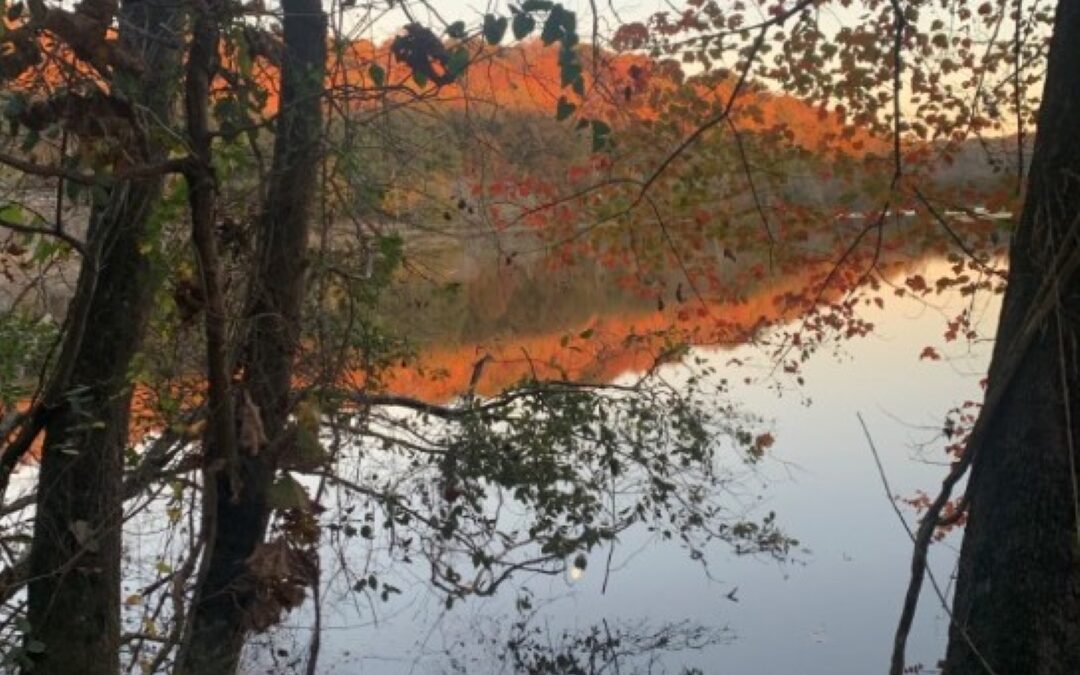
by | | 2021 Blog Competition, Environment
As I run on the boardwalk along the Chattahoochee River and past the Chattahoochee Nature Center, I witness the beautiful essence of this natural landscape. The autumn leaves are changing, the sun is setting over the river and the geese are migrating South for the winter season. One would’ve never thought that this form of lovely nature could ever be found in Roswell, Georgia. However, nature is beautiful in every way, and in every place and we must discover ways to preserve the essence of nature, especially the Chattahoochee.
Suddenly, I continue my stride from the boardwalk path onto the sidewalk and stumble across a sprite can. I almost trip over this myself and wonder how this small metal can could impact an entire ecosystem, further, what a larger amount of these littered cans could do. Water polluting of trash and chemicals causes a deep trouble for the wildlife pursuing here. People of Roswell, Georgia, the Chattahoochee, and every part of nature should realize the impact they have when dropping that sprite can on the riverbed.
Instead of littering while hanging out near the river, carry a trash bag, it doesn’t have to be large, and just throw away the designated trash. If you see a piece of trash on the ground, do not be afraid to pick it up and throw it away in the nearest trash can. Little do you know; you could have just saved multiple animals lives along with the natural cycle of the ecosystem. Humans can be very inconsiderate, especially when distracted, leading us to not care. Littering seems easy, but it impacts the natural wildlife and landscape in an indescribable way.
As far as businesses go, it’s easy to explain. Instead of dumping vile pollutants into the rivers with living things thriving in them, find other areas in which these pollutants will not affect the ecosystems. This is only for companies who must use some sort of pollutant. However, businesses should attempt to find better technologies to limit the pollutants dumped into the Chattahoochee. For example, finding better ways to meet production needs, using reusable energy, and locating new junk yards. I know for a fact that this will improve the smell of the water, the color and just the overall decency.
I believe that issues and pollutants within the climate is a top issue today. With the way that things are going, these issues will get increasingly worse. If humans do not pick up their trash or trash seen, or just do not recognize how lucky we are to live on a planet like this, life will get worse. If business do not use the advanced technology, we have today to figure out healthier ways to reverse the pollution cycle, life will progressively get worse.
The next generations will not have the same experience as I did, running on the road, smelling the beautiful flowers, and taking in the orange sunset over the rushing Chattahoochee. There are things that we can do as a community, passing these rituals on to further generations, making life better for everyone.
Photo credit: Alli Wiggins…Dusk at the Chattahoochee, featuring the orange autumn leaves.
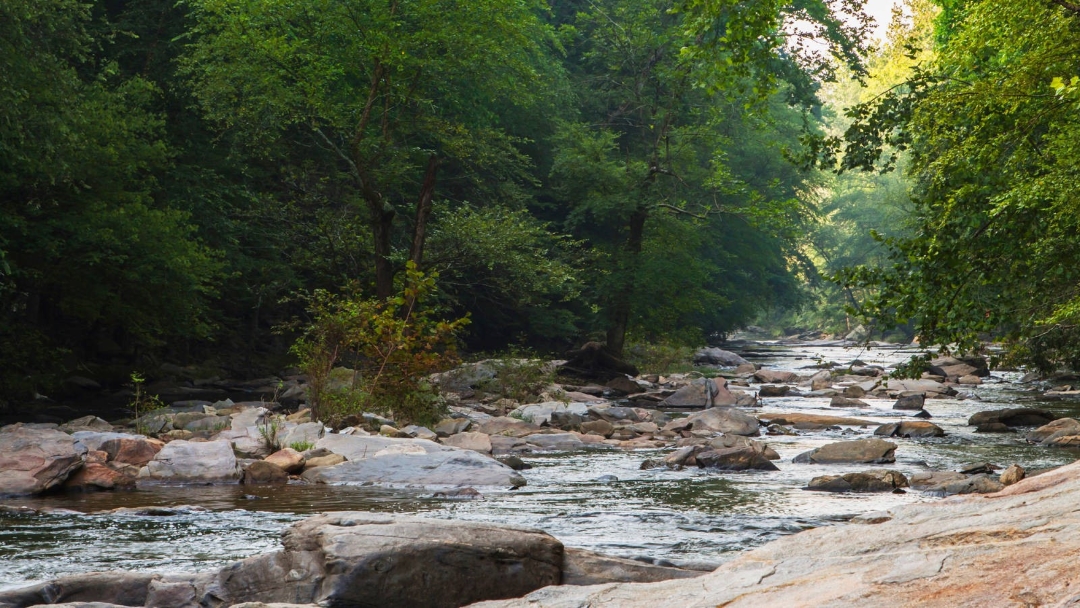
by | | 2021 Blog Competition, Environment
In the following 305 words, I will open your eyes and make you realize our Earth is dying. The cause is you; it’s your family, neighbors, and friends; it’s all of us. In contrast, you may not be the one throwing trash in the Pacific Ocean or owning a factory releasing toxic gases. The Roswell community doesn’t shy away from leaving a carbon footprint. We live in a beautiful city with restaurants, theaters, festivals, and fantastic shopping; residents tend to bat an eye when it comes to protecting mother nature. Being so privileged to access parks and trails, it only makes sense that we preserve and take care of what we have and fade our carbon footprint one step a time.
As a Roswell community, we can help the Earth by taking care of what we already have. The Chattahoochee River is well known to all Roswell and Georgia residents and being its caretakers is a role all of us should consider. Putting recycle bins along trails near the river would be beneficial to those who find trash along the riverbanks and trails. This will give people access to dispose of waste properly. Taking reusable water bottles rather than plastic ones on trails and on the Chattahoochee not only limits plastic consumption, but it also helps companies burn less plastic, which produce toxic fumes released into the air.
Another thing we can do is create events like ‘picking up trash day.’ An event like this could positively impact keeping the Chattahoochee clean and encourage others to do the same. Protecting our parks and trails won’t be easy and a one-day event won’t make it stay clean forever. It will take group effort and consistency, but if we can encourage others to be the Chattahoochee caregivers rather than a taker, the Roswell community will be a greener place.
The river has water flowing from the blue ridge mountains and is a heavily used water source in Georgia (photo credits: National Parks Conservation Association)
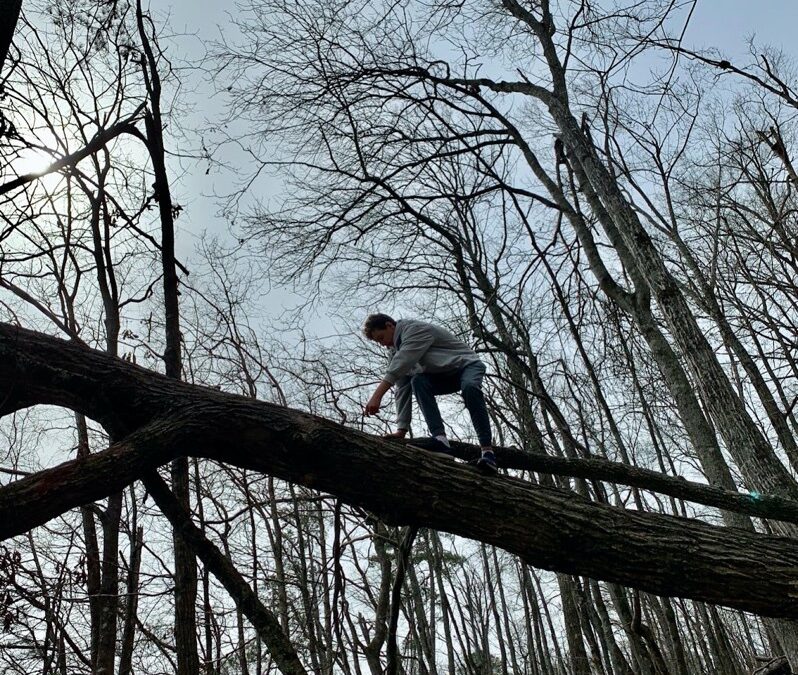
by | | 2021 Blog Competition, Environment
During the pandemic, many citizens of Roswell have made a conscious effort to get outside and explore local areas. Home to many waterways, parks and trails, Roswell provides a breath of fresh air and variety from being stuck within the same four walls. While the breath of fresh air is nice, it can be hard not to notice an empty soda bottle lingering on the river’s surface, or maybe a shopping bag caught in a tree. Litter like plastic bottles and bags act as visual representations of how we are damaging our environment, but not as commonly seen or discussed are our carbon emissions.
The terms “carbon emissions” and “carbon footprint” have been buzzwords when speaking on the environment for years now. It is important to have a grasp on what exactly these refer to. Simply put, one’s carbon footprint references how much they contribute to the production of carbon dioxide, which damages our planet by fast tracking climate change. So now the question is, how can the citizens of Roswell help?
Our daily consumption of products like gas, clothing, and food play into our carbon footprint. As far as transportation goes, the average car gives off 4.6 metric tons of carbon dioxide a year. That number can be reduced by simply arranging a carpool rotation with friends of utilizing one of the Marta bus routes that service Georgia. When it comes to clothing, shopping sustainably can become costly. Instead of buying new, try taking care of the pieces you already own or browse a thrift store with friends. Roswell has several chain thrift stores, and other, smaller consignment stores. Taking a look at food consumption, shopping at local markets and ensuring you do not over buy can decrease carbon emissions. The Roswell Farmers and Artisans Market runs through April to October and would be a good place to start. These seemingly simple steps can be the start of even bigger changes.
Take a second to take in the environment around you. We cannot truly enjoy our surroundings while actively contributing to their destruction. Roswell gifts us greenery, waterways, and wildlife, so it is only fair that we do our part to protect our city.
If you care to take a look at how you influence our environment take a look at The Nature Conservatory’s Carbon Footprint Calculator… https://www.nature.org/en-us/get-involved/how-to-help/carbon-footprint-calculator/
Featured image photo taken on one of Roswell’s many trails by Maille McLaughlin
Sources: “Facts on Transportation Greenhouse Gas Emissions.” EPA, Environmental Protection Agency, 8 July 2021, https://www.epa.gov/greenvehicles/fast-facts-transportation-greenhouse-gas-emissions.
“Sources of Greenhouse Gas Emissions.” EPA, Environmental Protection Agency, 27 July 2021, https://www.epa.gov/ghgemissions/sources-greenhouse-gas-emissions.

by | | 2021 Blog Competition, Environment
Roswell Garden Club is excited to announce the winners of the 2021 Environmental Blog Entry Competition:
1st place – Conserving the Chattahoochee, Savannah Young
2nd place – Each Individual Can Help Save the Chattahoochee, Krysta Schwab
3rd place – The Chattahoochee River Is at the Core of Roswell’s Existence, Claire Mulkey
4th place – How to be a Powerful Preserver of the Chattahoochee, Alli Wiggins.
5th place – Becoming Mother Nature’s Mother, Brooke Yates
6th place – Protecting our City with Small Changes, Maille McLaughlin
We encourage you to read the words of these student-bloggers from our community and take action on their suggestions. You can find the top 6 posts on RGC’s 2021 High School Blog Competition web page. Let’s work together to take implement these students’ suggestions and the National Garden Club, Inc.’s challenge to move from consumers to caretakers of our air, water, forest, land, and wildlife.
The featured image for this post was taken by Alli Wiggins.







 endorsement, here’s the one I bought, in case you are in the market. I bought the
endorsement, here’s the one I bought, in case you are in the market. I bought the 



